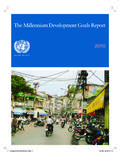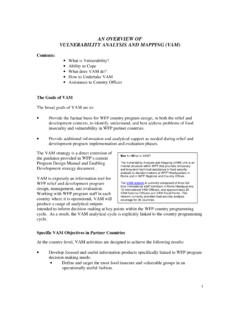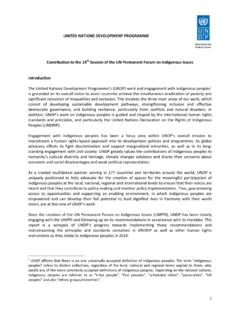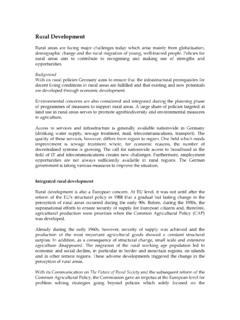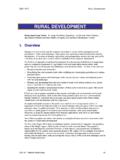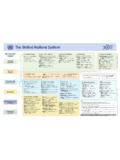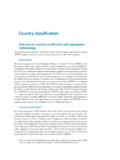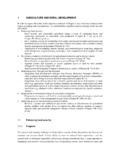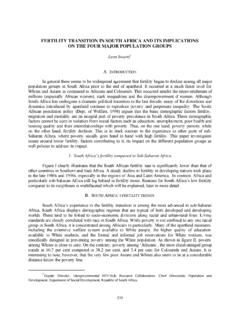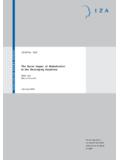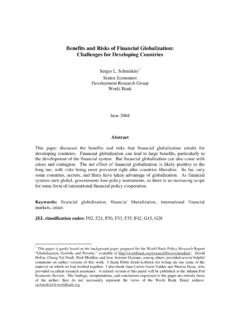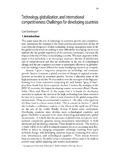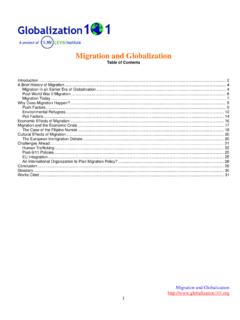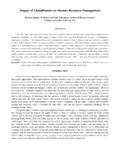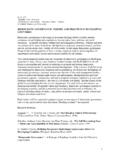Transcription of Social Affairs Economic Globalization: Trends, Risks …
1 Economic &. Social Affairs CDP Background Paper No. 1. ST/ESA/2000/CDP/1. 2000. Economic globalization : Trends, Risks and Risk Prevention Gao Shangquan JEL classification: F (International Economics); O1 ( Economic Development). Keywords: globalization ; policy coordination; capital controls. Mr. Gao Shangquan, a member of the Committee for Development Policy, is a former vice-minister of State Commission for Restructuring the Economic System (SCRES) in China. At the present time, Mr. Gao is President of the China Research Society of Enterprise Reform and Development, Chairman of China Reform Foundation and also a professor and supervisor at Beijing University. Contents Economic globalization is an Irreversible Trend ..1. Risks brought along by Economic globalization to Developing Countries and the Prevention against Related Risks ..4. CDP Background Papers are preliminary documents circulated in a limited number of copies and posted on the DPAD website at to stimulate discussion and critical comment on United Nations the broad range of Economic , Social and environmental issues Development Policy and Analysis Division associated with the issues dealt with by the Committee for Department of Economic and Social Affairs Development Policy.
2 The views and opinions expressed 2 United Nations Plaza, Room DC2-2170. herein are those of the author and do not necessarily reflect New York, New York 10017 USA. those of the United Nations Secretariat. The designations Tel.: + 1 212 963 5497. and terminology employed may not conform to United Fax: + 1 212 963 1061. Nations practice and do not imply the expression of any email: opinion whatsoever on the part of the Organization. Economic globalization : Trends, Risks and Risk Prevention Gao Shangquan Economic globalization is an Irreversible Trend Economic globalization refers to the increasing interdependence of world economies as a result of the growing scale of cross-border trade of commodities and services, flow of international capital and wide and rapid spread of technologies. It reflects the continuing expansion and mutual integration of market frontiers, and is an irreversible trend for the Economic development in the whole world at the turn of the millennium. The rapid growing significance of information in all types of productive activities and marketization are the two major driving forces for Economic globalization .
3 In other words, the fast globalization of the world's economies in recent years is largely based on the rapid development of science and technologies, has resulted from the environment in which market Economic system has been fast spreading throughout the world, and has developed on the basis of increasing cross-border division of labor that has been penetrating down to the level of production chains within enterprises of different countries. The advancement of science and technologies has greatly reduced the cost of transportation and communication, making Economic globalization possible. Today's ocean shipping cost is only a half of that in the year 1930, the current airfreight 1/6, and telecommunication cost 1%. The price level of computers in 1990 was only about 1/125 of that in 1960, and this price level in 1998 reduced again by about 80%. This kind of time and space compression effect' of technological advancement greatly reduced the cost of international trade and investment, thus making it possible to organize and coordinate global production.
4 For example, Ford's Lyman car is designed in Germany, its gearing system produced in Korea, pump in USA, and engine in Australia. It is exactly the technological advancement that has made this type of global production possible. Moreover the development of the networking-based economy has given birth to a large group of shadow enterprises, making the concept of national boundaries and distance for certain Economic activities meaningless. 2 CDP Background Paper No. 1. If technological advancement and IT development were assumed as the technological driving force for Economic globalization , then the market-oriented reform carried out throughout the world should be regarded as the institutional driving force for this trend. Under the framework of GATT and WTO, many countries have gradually cut down their tariff and non-tariff barriers, more and more countries open up their current accounts and capital accounts. All of these have greatly stimulated the development of trade and investment.
5 Moreover the transition of the former centralized planned economies to market economies has made it truly possible to for the world's economies to integrate into a whole. Multinational corporations (MNCs) have become the main carriers of Economic globalization . They are globally organizing production and allocating resources according to the principle of profit maximization. And their global expansions are reshaping macroeconomic mechanisms of the operation of the world economies. In 1996, there were altogether only more than 44,000 MNCs in the whole world, which had 280,000 overseas subsidiaries and branch offices. In 1997, the volume of the trade of only the top 100 MNCs already came up to 1/3 of the world's total and that between their parent companies and their subsidiaries took up another 1/3. In the US$ 3,000 billion balance of foreign direct investment at the end of 1996, MNCs owned over 80%. Furthermore, about 70% of international technological transfers were conducted among MNCs.
6 This type of cross-border Economic activities within same enterprises has posed a challenge for the traditional international trade and investment theories. globalization of the financial sector has become the most rapidly developing and most influential aspect of Economic globalization . International finance came into being to serve the needs of international trade and investment activities. However, along with the development of Economic globalization , it has become more and more independent. Compared with commodity and labor markets, the financial market is the only one that has realized globalization in the true sense of globalization '. Since 1970's, cross-border flow of capital has been rapidly expanding. In 1980, the total volume of cross-border transactions of stocks and bonds of major developed countries was still less than 10% of their GDP. However, this figure had far surpassed 100% in 1995. The value of the average daily transactions of foreign exchanges has grown from US$ 200 billion in the middle of E c o n o m i c G l o b a l i z a t i o n : Tr e n d s , R i s k s a n d P r e v e n t i o n 3.
7 1980's to the present US$ 1,200 billion, which is 85% of the foreign exchange reserves of all the countries in the world and 70 times as large as the value of the daily export of commodities and services. The process of economy globalization is also the process of global industrial restructuring and readjustment. With the development of science and technology and increase of income level, industrial structures of all the countries have been also undergoing readjustment and upgrading. In recent years, developed countries in the west are gradually entering the era of knowledge economy and have started to shift to developing countries many labor-intensive industries of weak international competitiveness. This process of cross-country shift is pushing forward an in-depth development of Economic globalization . On the other hand, there has existed a surplus of productivity since the end of the cold war. Due to this fact, Economic globalization has intensified the competition at the international market among enterprises from different countries.
8 In order to raise their positions and improve their competitiveness at the international market, both domestic enterprises and those from other countries have been resorting to mergers and acquisitions one after another, which has resulted in tides of industrial restructuring. Take a few cases just as a demonstration: the most recent acquisition of Mannesmann by Vodaphone, acquisition of MCI by British Telecom, acquisition of by Deutsche Bank, and the amalgamation of Citibank with Travelers and that of Daimler-benz. All of these restructuring activities will exert far-reaching influence on the world's industrial competition pattern. Developed countries have been playing a dominant role in the process of Economic globalization . In 1996, the total volume of exports of developed countries was US$ 4,057. billion, accounting for of the world's total value of international trade. In 1995, the foreign direct investment by 10 major developed countries including the G7, Switzerland, Sweden and the Netherlands took up of the total value of foreign direct investment in the whole world.
9 The dominant role of developed countries in the process of Economic globalization is also reflected in the fact that it is they that determine the rules for international Economic exchanges. Although current rules of game for international Economic activities have the good aspect of being in keeping with socialized mass production, they are generally laid down under the dominance of developed countries. 4 CDP Background Paper No. 1. International Economic and financial organizations are under the control of the United States and other western countries. They have been using these advantages to promote and dominate the development of globalization . At the same time, they are the largest beneficiaries of Economic globalization . In November of last year, China and the United States reached an agreement on the China's accession to WTO. With this, China made a decisive step forward on its way to becoming a member country of WTO. The signing of this agreement shows the determination of the Chinese government to firmly speed up the reform of its Economic system and further integrate itself into the process of Economic globalization .
10 It is a win-win agreement. On one hand, the United States can increase its exports of goods and services to China, thus creating more employment opportunities. While on the other hand, China can boost its Economic growth by increasing its share of the US market. In addition, more advanced technologies, management experience and capital can be introduced from developed countries. And the pressure international competition will become a driving force for the reform and opening toward the outside world. This in turn will promote the competitiveness of china's enterprises. Risks Brought along by Economic globalization to Developing Countries and The Prevention against Related Risks The participation of developing countries in the globalization process can enable them to better utilize their comparative advantages, introduce advanced technologies, foreign capital and management experience. It is also favorable for eliminating monopolistic behaviors and strengthening market competition.
